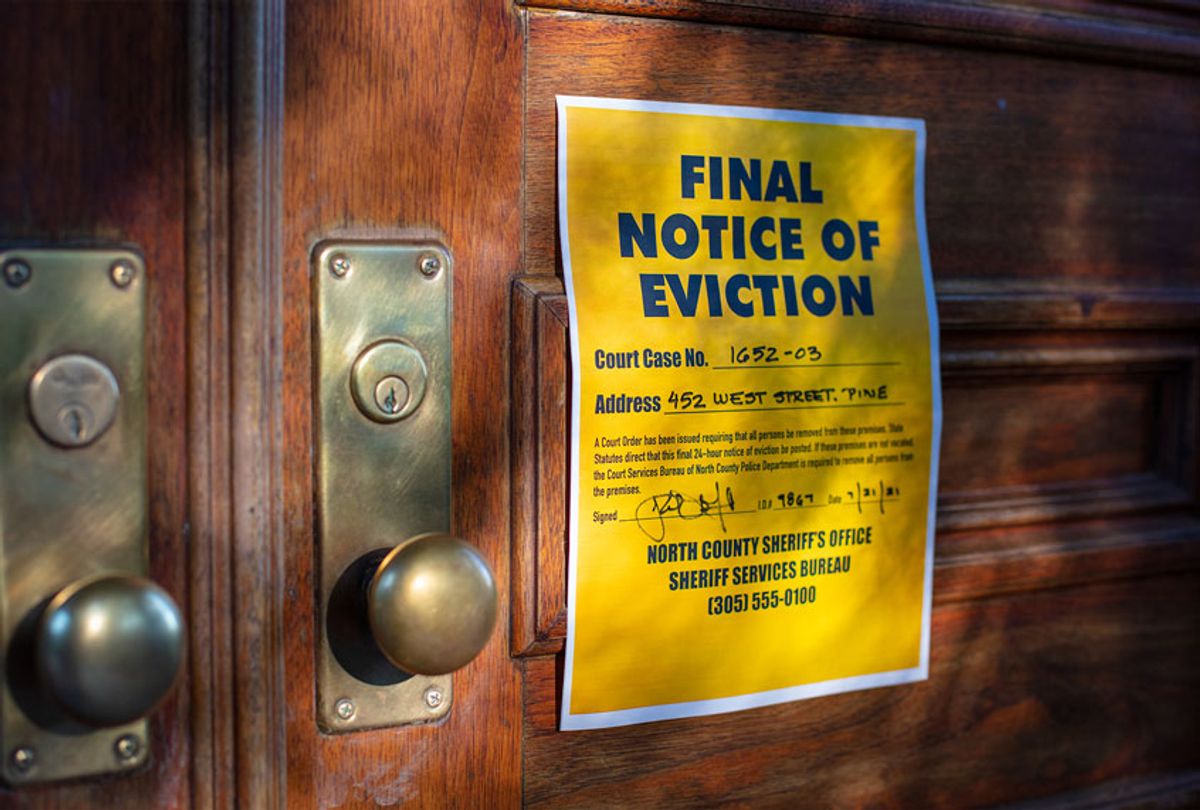President Donald Trump declared a national eviction moratorium Tuesday night that, while postponing homelessness for many until December, does not protect all renters and does nothing to address the underlying long-term housing crisis caused by the coronavirus pandemic.
According to a draft of the ban posted on the Federal Register, the Trump administration argues that "COVID-19 presents a historic threat to public health" and that "in the context of a pandemic, eviction moratoria — like quarantine, isolation, and social distancing—can be an effective public health measure utilized to prevent the spread of communicable disease." Because the moratorium is being cast as a public health policy, it is being implemented through the Centers for Disease Control and Prevention (CDC).
While the order will cover some vulnerable tenants, however, many will not benefit from it. It only applies to individuals with $99,000 or less in income, or couples with less than $198,000 in joint income.
In addition, people who wish to be protected must jump through a number of bureaucratic hurdles. Specifically, they will need to visit the CDC website to download a declaration to present to their landlords; will have to prove that they previously sought government assistance; must show that eviction will likely lead to either homelessness or being forcibly moved into congregate housing; and will be required to demonstrate that they are not able to pay their rent due to the pandemic.
Economists and housing experts say that, because of these hurdles and because the legal system often favors landlords, tenants are unlikely to benefit much.
"Landlords denied eviction via this order will claim other infractions that specifically are NOT covered by this order and evict on that basis, putting the tenant at a great disadvantage," Dr. Richard D. Wolff, professor emeritus of economics at the University of Massachusetts Amherst, told Salon by email. "A landlord who claims any such infractions can be evicted and can then challenge such eviction in courts (which costs legal fees etc.). This is a huge loophole that will be used against tenants. Tenants can be charged late payment fees, interest etc for non-payment of rent that accrues and becomes a legal obligation of a tenant as of Jan 1, 2021."
He added, "Landlords will fear that tenants who know they cannot pay accumulated rents, interest, late payment fees, etc after December 31 will be sorely tempted NOT to expend scarce funds maintaining rented apartments. This will prompt landlords to raise fees, et cetera, in a vicious cycle."
Dr. Robert Silverman, a professor of urban and regional planning at the University of Buffalo who specializes in housing issues, told Salon by email that, because Trump's moratorium does not include any measure for rent forgiveness, it only temporarily wards off the eviction crisis for the people that it manages to cover.
"Without rent forgiveness, tenants will ultimately have to pay back rent along with any late-fees and penalties, or face eviction when the moratorium is lifted," Silverman explained. "It is ultimately up to landlords to decide if they are going to pursue eviction, but at some point in the future, we can anticipate that there will be a spike in evictions across the country. It could be very destabilizing to the economy at the very time that the COVID crisis ends. For renters, it will also have ripple effects on their credit history and ability to find replacement housing."
Dr. Gabriel Mathy, a macroeconomist at American University, questioned whether Trump's new policy will hold up in court.
"It's unclear whether Trump's eviction moratorium is legal, but if it is and is effective, it will reduce the number of evictions," Mathy wrote to Salon. "The number of potential evictions in the pipeline without moratoria is large, primarily among poorer Americans. We are seeing a 'K-shaped' recovery, with the rich doing well and recovering rapidly from the pandemic economic crisis and the poor not recovering as rapidly."
This is not the first time that Trump has implemented a housing policy that falls short on its promises. Earlier this month, the president issued an executive order that he claimed would provide assistance to renters and homeowners but did little more than order the Secretary of Health and Human Services and the CDC director to examine whether temporarily halting evictions would be necessary to halt the spread of COVID-19.
The National Low Income Housing Coalition criticized the executive order at the time as "an empty shell of a promise that does nothing to prevent evictions and homelessness and acts only to mislead renters into believing that they are protected when they are not." They called that executive order "reckless and harmful, offering false hope and risking increased confusion and chaos at a time when renters need assurance that they will not be kicked out of their homes during a pandemic."



Shares